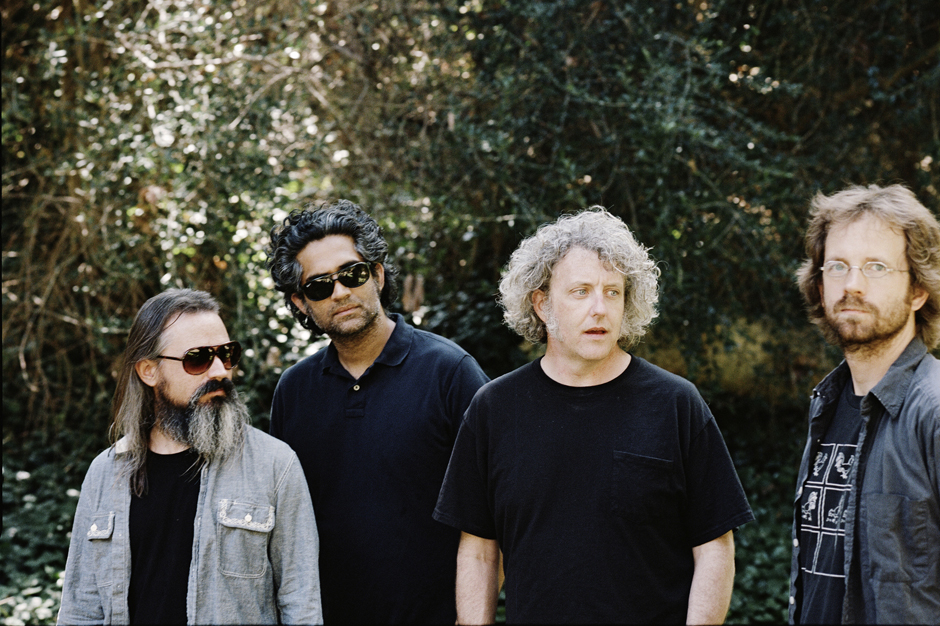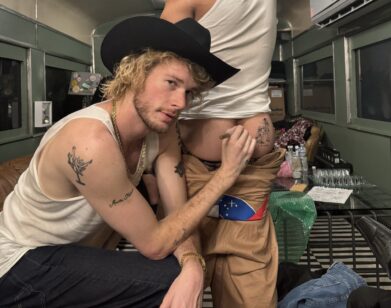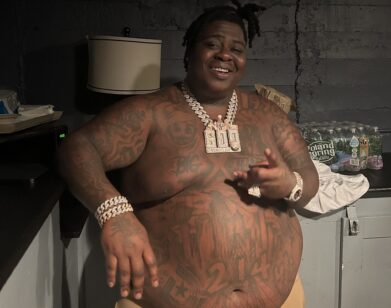Wooden Shjips, On Land

2012 was a big moment in the career of Ripley Johnson’s Wooden Shjips project—or maybe more accurately, for the first time it wasn’t. After a workmanlike string of LP releases for experimentally minded indie labels like Holy Mountain and now Thrill Jockey, Johnson decided to put the project to bed, at least for a few months. So for the first time since 2007, a year still had death and taxes, but no new material from Wooden Shjips. That’s not to say that Johnson just took a break. Aside from beginning the writing stages of this week’s Back To Land, and relocating from San Francisco up to Portland, his other band Moon Duo (a collaboration with Johnson’s wife Sanae Yamada) released its third LP Circles.
He’s somehow managed to stay busy, despite living in what he describes to be a far more relaxed and comfortable environment than where he used to make Shjips records. Calling from his Portland home early on Halloween, Johnson spoke effusively about how his environments affect his recordings—and specifically how his move to Portland sparked Back To Land.

COLIN JOYCE: It’s been two years since the last Wooden Shjips album, but you never really seem like you take much of a break. What has the road to this record been like?
RIPLEY JOHNSON: The last time we played [live] was summer of 2012. We were burned out on touring so we decided to stop. We have a really aggressive booking agent. [laughs] They’re always coming up with shows for us, but we decided we wanted to just stop and make another record. In the meantime, I made another record with my band Moon Duo. The touring and recording never really stopped for me, it just stopped in the Wooden Shjips context. Last winter when I came back from touring with Moon Duo, I just settled in and started writing songs. I just moved to Portland last August. It was my first winter at home and my first time in a home in a couple of years. That was the setting for the beginning of the record.
JOYCE: Was Portland a particularly fruitful creative environment?
JOHNSON: Part of it was just being home and having a home, which was just a huge change for me. Part of it is Portland, because it’s a really mellow city, especially where we live, on the east side. It’s hardly a city. It’s cute little neighborhoods and little single-family homes, but with all the amenities of a big city. All the touring bands come through here and there’s great food, all the stuff like that. It’s homey and low-key with lots of nature nearby. It’s very green and lush even in the winter.
JOYCE: Do you think that mellowness reflects itself on Back To Land?
JOHNSON: Yeah, for sure. It’s the place, the time of year, and moving into a home. I got out all my old records that I had in storage for a few years. It was very cozy. My mindset was very relaxed and home-centric, especially after coming off the road. I wasn’t going out a lot.
JOYCE: Are you not used to writing in a relaxed mindset?
JOHNSON: Not usually, but the last Moon Duo record we did in Colorado. That was a similar thing. We were living in the mountains and that was super quiet there. We didn’t have any neighbors and you’d walk out the back door and you were in the woods at 10,000 feet. It was pretty unusual. So nature and the environment have played a big role in the last couple of records I’ve made, as opposed to being right in the middle of a big city.
JOYCE: Was your process more hectic when you were living in San Francisco?
JOHNSON: I didn’t even notice it when we were living there. People are always curious about San Francisco. It has a special history when it comes to the art, but when you’re living in it, you don’t really notice. You get used to the day to day. I’m sure it’s similar in New York. When you visit, from the outside, it seems so special. It can have such an impact on you, but when you live there for a while it becomes normal.
JOYCE: You mentioned getting out a bunch of your old records, is there anything that you were listening to in particular while you were making the new record?
JOHNSON: A lot of my old records are classic rock kind of stuff, the stuff I don’t have available on my iPhone or digitally. I don’t have all the Creedence Clearwater Revival records on iTunes, you know? So it’s a lot of classic rock, a lot of it’s mellow. I’m a morning person, so I’m likely to get up in the morning and make a pot of coffee and put on a Neil Young record or whatever. I was definitely inspired by some of this old American rock music.
JOYCE: This album is your version of a classic rock record then?
JOHNSON: That’s the way I think about it. Part of that’s the way we recorded it. I’m not sure that it’s that different from our other record. Texturally, it’s a little more classic rock to me. A lot of the stuff that we’ve been compared to, even in the past, which was noisier, weren’t really influences on us. Spacemen 3, we never really listened to, but if you look at their influences, it’s a lot of the same stuff. It’s The Stooges, 13th Floor Elevators, the stuff that makes an impact on you when you’re in your 20s. When I was in high school, I had my dad’s record collection, which he never listened to, but it was all classic rock. There was some good and some really bad stuff, but it wasn’t until later that I started getting into more underground stuff like I mentioned. I had no money when I was that age, so I just listened to whatever I could get my hands on, and most of it was that classic rock stuff.
JOYCE: If classic rock is something you associate with your dad? Do you think that this is a record that he’d be into?
JOHNSON: [laughs] No. He doesn’t really listen to music. I should ask him, but he’s really elusive when you ask him direct questions. I don’t know that I ever saw him listen to any of his records. Maybe he listened to them when I was really young or before I was born. It was almost like he bought the records in an estate sale or something. It was just all over the map and he never listened to it. In the ’60s, if you look at old, like, Playboy magazines there’s all these ads for home stereos. He might’ve thought that’s just what a man does. He had a nice stereo and records and maybe he thought that’s what you had as a man. So I don’t really associate it so much with him as with my own coming of age and widening my own horizons artistically, being exposed to things that are transgressive. A lot of that sparked my creative juices early. I grew up in Connecticut where there was nothing going on, so I always had dreams of a rock-‘n’-roll lifestyle.
JOYCE: And you got out.
JOHNSON: As soon as I could I did. Portland was never really on my radar. California was such a big thing, and once I got to California I explored the West a bit more. We never made it up this far that often, but in California, there were so many road trips. California is such a huge state, and it has so many diverse environments. You can go to the desert or the mountains or the coast. It has it all.
JOYCE: Even though you relocated by like 10 hours, you stayed out on that coast. Do you find yourself identifying with the West?
JOHNSON: That was definitely something we thought about when we moved to Colorado. My idea of the west was just California, but in its own way, Colorado feels more Western. You actually see cowboys, and there’s the Rocky Mountains. There’s all sorts of Western symbols and lifestyle. When we were leaving there, and looking where to move to, we looked on the East Coast. We just realized that culturally we felt more at home on the West. There’s a sense of freedom and space out here, and I feel at home. I lived so many years in San Francisco, which felt like a progressive outpost. In a lot of big cities, you can be progressive and feel comfortable, but there’s a different vibe in San Francisco, and Portland, to me, is like a mini-San Francisco.
JOYCE: It’s funny that you mention “freedom” and a sense of “space,” because those are the sorts of descriptors that could be applied to your music. Do you think that it’d be possible to make the sort of records that you do in the confines of a more claustrophobic city?
JOHNSON: I’ve thought about that. When you’re making music you’re sometimes aware of your environment, on a surface level, but it’s interesting to look back at work you’ve done over a period of time and see how you were affected. At the time you don’t notice though. It’d be interesting to go to New York or Chicago and make a record and see how that’d affect the music. People used to say we had a San Francisco sound, but I never really got that until I moved away. It’s the sound of really long drives and big open spaces. It’s different from being on the subway with your headphones on.
BACK TO LAND IS OUT TOMORROW, AND WOODEN SHJIPS WILL PLAY MERCURY LOUNGE ON WEDNESDAY, NOVEMBER 13, AND KNITTING FACTORY ON THURSDAY, NOVEMBER 14. FOR MORE, PLEASE VISIT WOODEN SHJIPS’ WEBSITE.






